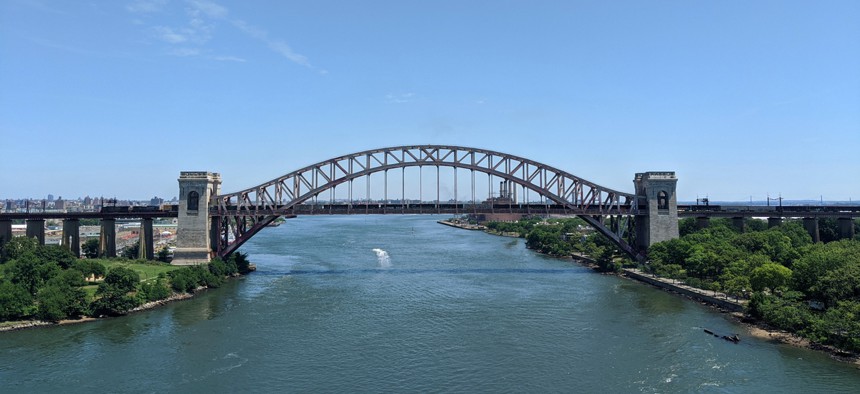State Attorneys General Sue Over Clean Water Act Changes

A bridge over the East River in New York. Shutterstock
They say that the new rule will lessen states’ abilities to combat pollution.
The Trump administration this month announced changes to the Clean Water Act that limit the ability of states and tribes to block energy or infrastructure projects on the grounds it will pollute water. State attorneys general and environmental nonprofits responded this week by filing lawsuits against the Environmental Protection Agency over the changes, which they say clear a path for environmentally destructive development projects.
The changes take aim at Section 401 of the Clean Water Act, which allows states and tribal authorities to stop or put additional conditions on federally permitted projects like pipelines if they determine that the projects might cause pollutant discharge into water.
Under the new rules, which were published on July 13 and will go into effect on September 11, states and tribal authorities are limited in the information they can demand of companies about the impact of their projects. They are also prohibited from considering how a project will impact a state’s water quality as a whole or what it would mean for climate change, and instead will be confined to a much more narrow scope limited to the effect on specific waterways.
Twenty-one state attorneys general sued the EPA on Tuesday, saying the change cripples the ability of states to independently review and object to projects that might violate state water quality laws. The attorneys general also allege that the EPA did not follow proper procedure in issuing the new rule.
The “arbitrary and capricious” change “upends fifty years of cooperative federalism” and “unlawfully usurps state authority to protect the quality of waters within their borders,” the attorneys general wrote in their filing, which was submitted to the U.S. District Court for the Northern District of California.
Leading the suit is California Attorney General Xavier Becerra, who said in a statement that “the Trump administration wants to clear the deck for fossil fuel infrastructure” by “reducing the scope and time for review.”
Projects requiring review under Section 401 range from oil and gas pipelines, fossil fuel facilities like coal plants, housing and commercial land development, wastewater treatment facilities, and hydropower infrastructure like dams.
EPA Administrator Andrew Wheeler defended the changes, saying they are to “curb abuses of the Clean Water Act that have held our nation’s energy infrastructure projects hostage.” The changes, he said in a statement, will return the Clean Water Act “to its original purpose, which is to review potential impacts that discharges from federally permitted projects may have on water resources, not to indefinitely delay or block critically important infrastructure.”
In recent years, two states shut down major fossil fuel projects partly by using the Section 401 review process. Iin 2019, New York denied a certification for the 124-mile long Constitution pipeline, which would have moved natural gas to New York from Pennsylvania. The project, which environmentalists warned would be catastrophic to New York’s waterways, was abandoned in February. After that announcement, Trump called New York’s efforts to block the pipeline “unfair to the rest of the country.”
Similarly, Washington state in 2017 denied a certification for the Millennium Coal Terminal after the state found that its construction would destroy 24 acres of wetlands, impair tribal access to protected fishing sites, and require extensive intrusion into the bed of the Columbia River. If the consideration had taken place under the new rule, the state would not have been able to consider certain factors, like the impact of ship traffic on wildlife or fishing sites.
The new rule is one of several changes to environmental protections that the Trump administration has rolled out in the past few months, many of which are aimed at speeding up development projects. State attorneys general, mostly in Democratic states, have brought numerous court battles over rolled back environmental protections and rule changes that lessen states’ authority.
At least one environmental nonprofit has also sued over the most recent rule change. Maya van Rossum, with the Delaware Riverkeeper Network, said in a statement that the organization filed suit to stop the removal of regulatory obstacles that are “legal and necessary measures that help states protect their environment and communities.”
Other environmental groups, including the Sierra Club and the National Resource Defense Council, condemned the rule change. Joan Walker with the Sierra Club said that “this erosion of our fundamental clean water protections drastically limits states’ ability to protect their water at a time when access to clean water is more important than ever.”
Emma Coleman is the assistant editor for Route Fifty.
NEXT STORY: Why COVID-19 just accelerated the online imperative of local government






